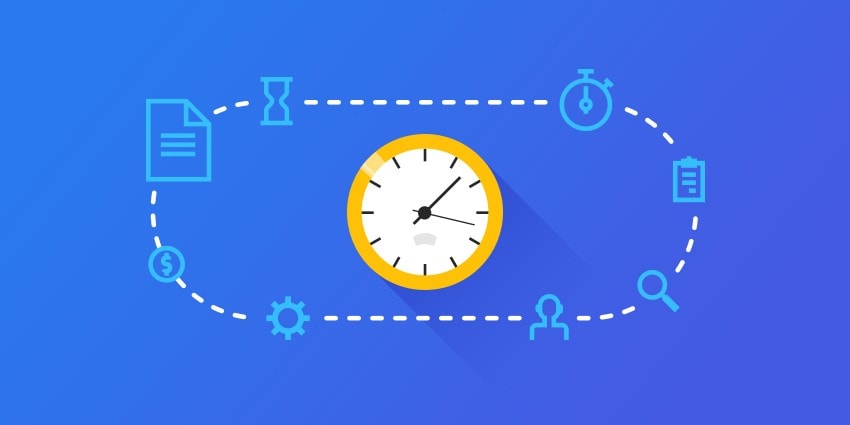Wish you had a couple more hours in your day? You’re not alone.
Time is the most expensive currency we have. In fact, it’s invaluable because it can’t be exchanged or reversed. Time spent is time gone. Forever.
Whether you’re a freelancer on a tight schedule or a leader who wants to make better use of your team’s hours, time management is probably your number one priority. If it’s not, it should be.
Enter time management apps – your partner in crime for boosting productivity. There is a wide range of desktop and mobile apps on the market that can help you manage your time. While variety is great, it’s important to know what the main features to look for in a time management app are.
Boost your team’s efficiency with Hubstaff's productivity tools
Try it free for 14 daysTime management apps: the top choices for productive teams
Now that you know why time management is crucial, it’s time to choose the app that will help you manage projects and your team’s time. Here’s our list of the best time management software on the market:
- Hubstaff
- Shift
- Slack
- Twist
- focus booster
- Any.do
- Todoist
- Habitica
- Forest
- Toggl
- RescueTime
- Trello
- Remember the Milk
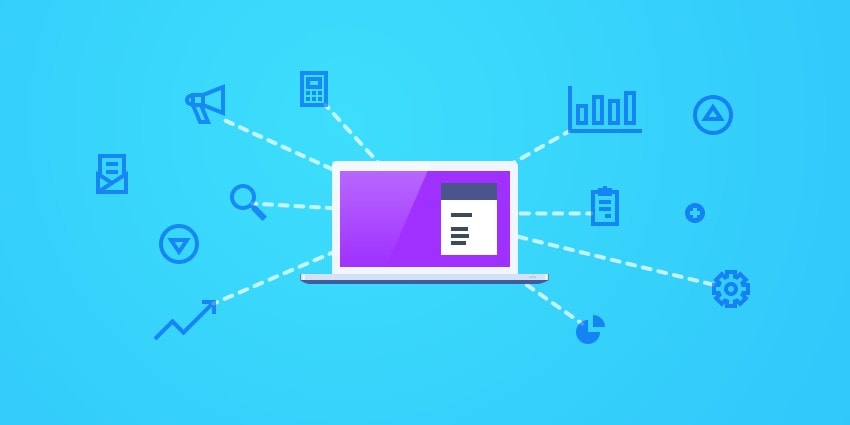
1. Hubstaff
Hubstaff has been called one of the best time management apps out there. With Hubstaff, you can track time to projects down to the second. Managers can view their team’s productivity with activity scores and proof of work features like optional screenshots.
Hubstaff is extremely versatile and is used by freelancers, remote teams, and field service workers. If you’re not sure where your team stands, Hubstaff is broken down into three subcategories:
- Hubstaff Time for basic time tracking
- Hubstaff Desk for in-office and remote teams
- Hubstaff Field for field service and distributed teams
If you’re just looking to keep track of your team’s billable hours, Hubstaff Time works best. If your needs change, you can always automate your payroll, expense reporting, and customer service efforts with over 30 integrations. The mobile app is available on iOS and Android devices.
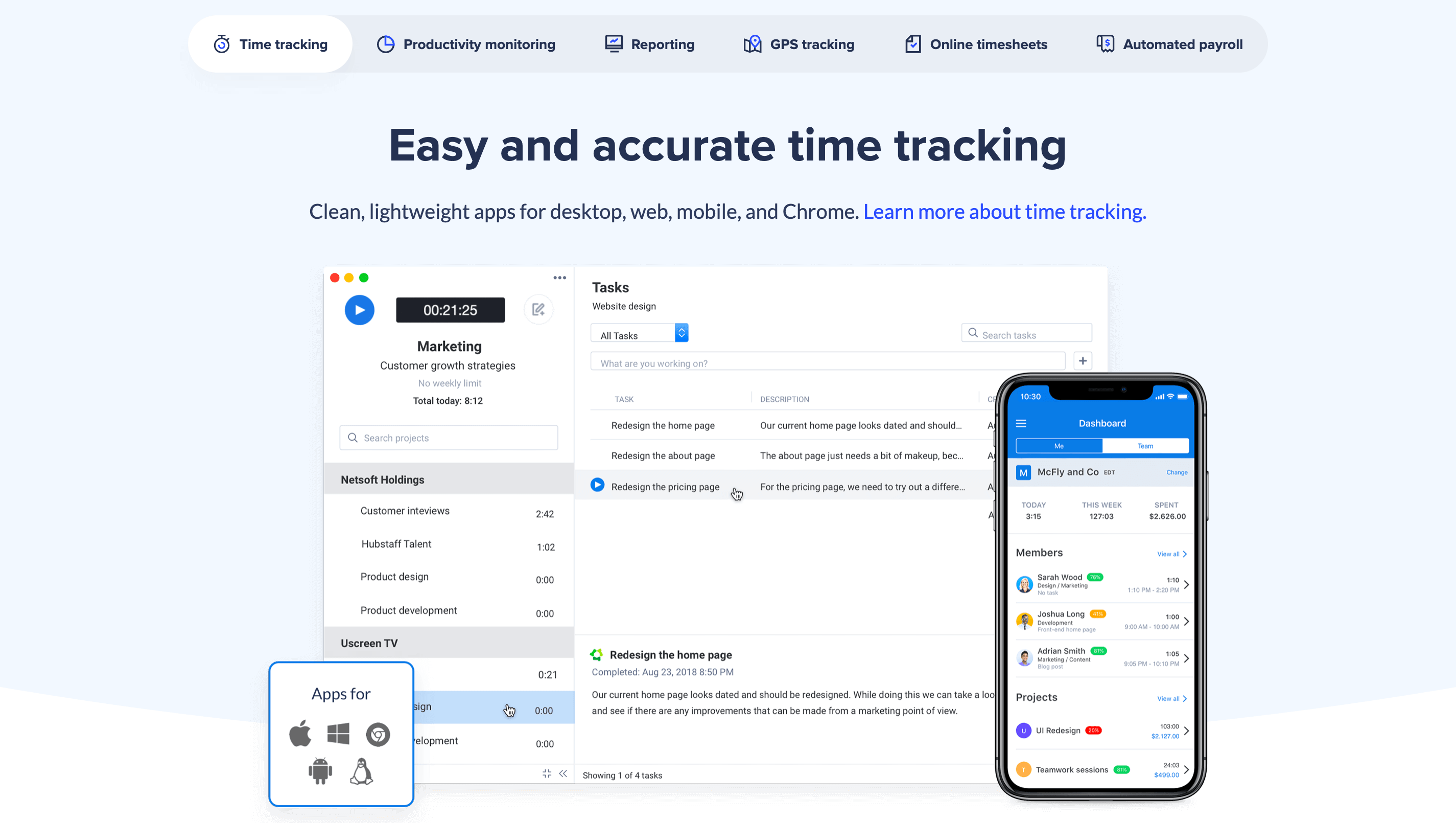
Features: Track time spent on task management with Android and iOS mobile apps, the Chrome extension, and Windows or Mac desktop software. Send invoices to your clients with a few clicks. Monitor your team members by hours worked and work activity with notification-based reminders. Automate payroll and timesheets. Integrates with all major project management apps, as well as the Hubstaff Tasks software.
Suited for: Freelancers, remote teams, field service teams, agencies, and businesses that need detailed or more reliable timesheets.
Price (Hubstaff Time)
- Time Free: $0 for one user only
- Time Starter: $7.00 per user per month
- Time Pro: $10.00 per user per month
- Enterprise: $20.00 per user per month
2. Shift
Shift is a productivity platform designed to streamline your workflow so that you can spend your time more efficiently. Without the hassle of logging in and out each time, Shift users get single-click access to over 900 of the web’s most popular applications, extensions, and email accounts.
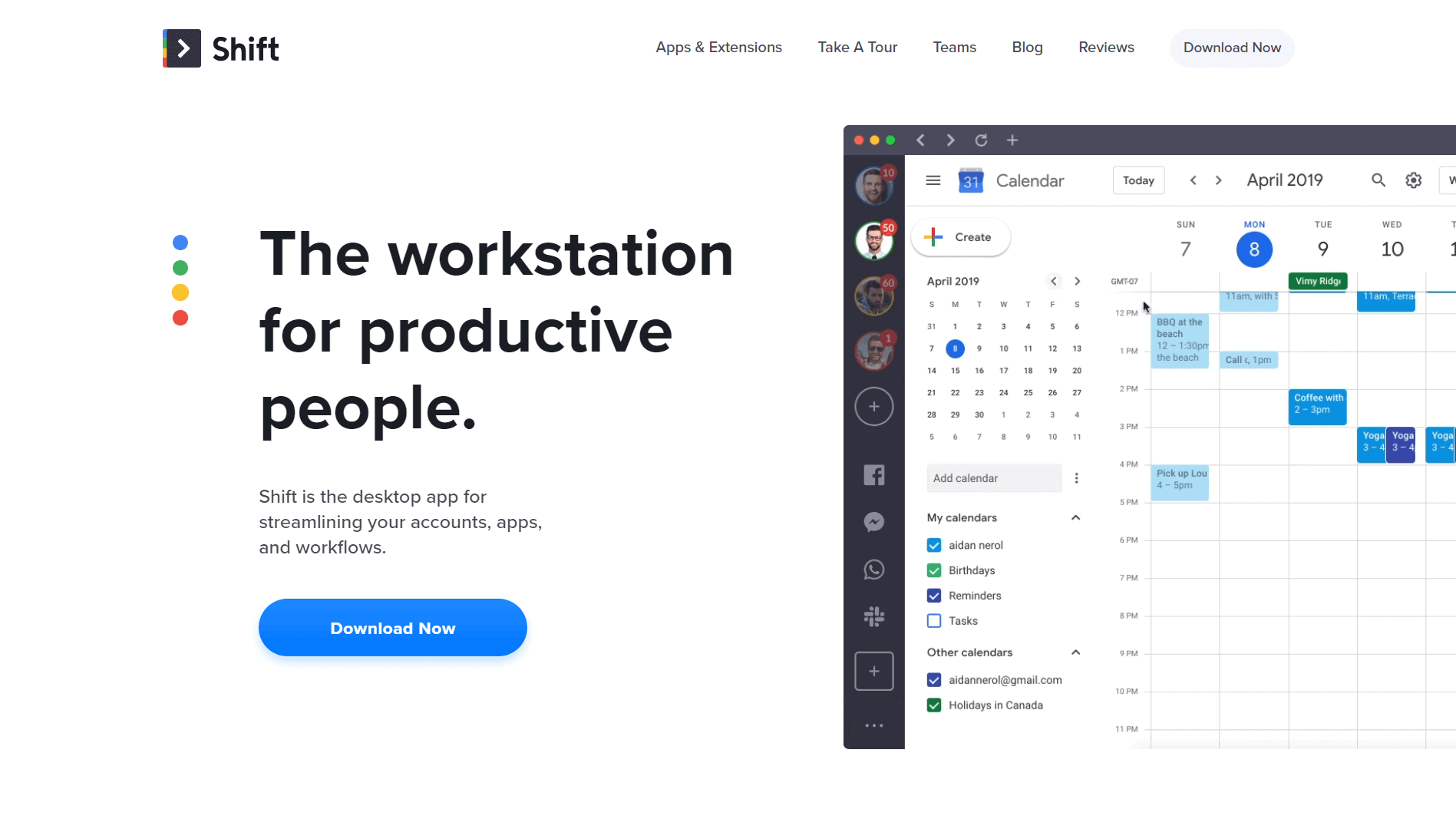
Features: Workflow management on Windows, Mac OS, or Linux. Email integration with Gmail, Outlook, or Office365 and app integration with Slack, Facebook, Asana, Spotify, and 900+ top apps. Unified search, custom notifications, and more.
Suited for: Freelancers, agencies, productivity hackers, startup founders
Price
- Basic: $0 (free)
- Advanced: $99.99 per year (billed annually)
- Teams: $99.99 per user per year
3. Slack
Slack is one of the most well-known team chat apps available today. It helps teams around the world stay connected, focused, and organized when collaborating. The free version of Slack allows you to create channels, share files, and make video calls with your team. Powerful integrations make Slack a helpful project management tool as well.
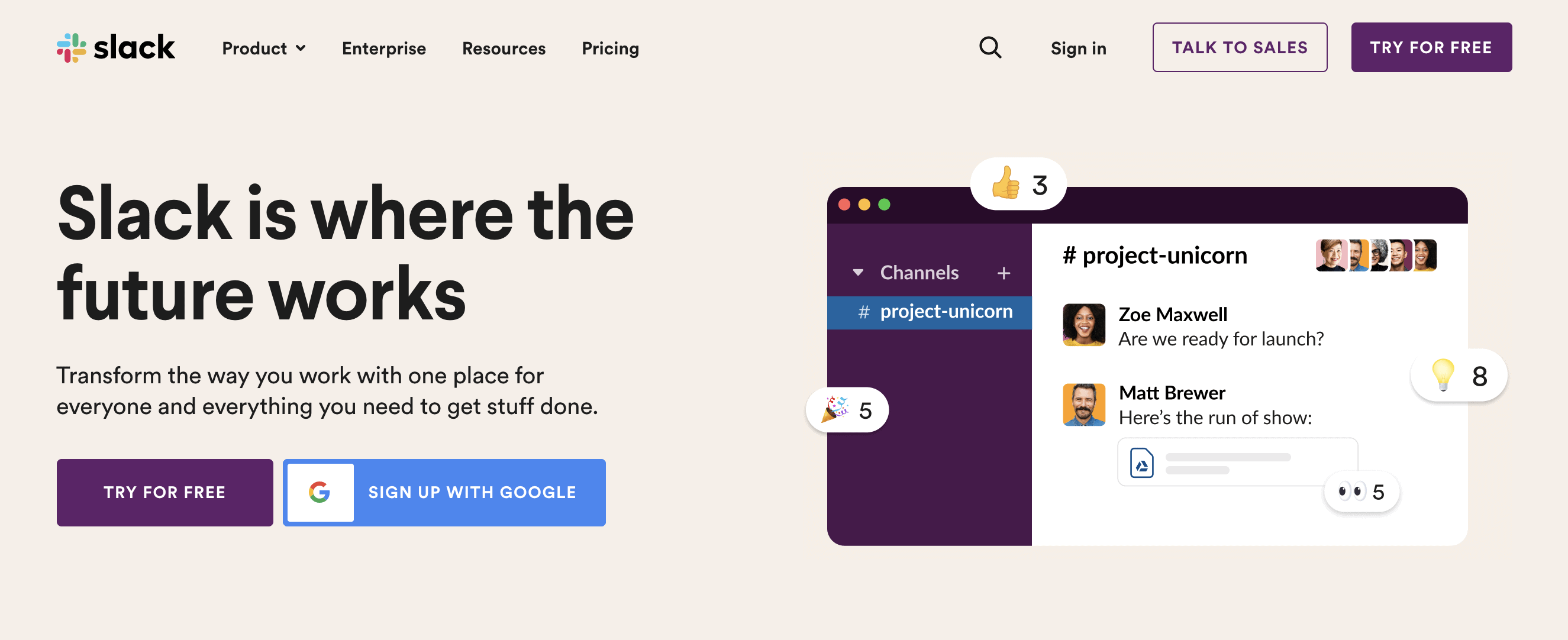
Features: Real-time communication, file sharing, voice and video calling, team organization. A wide range of powerful integrations. Available on desktop, web, iOS app, Android app, and Apple Watch.
Suited for: Simple day-to-day conversations and file sharing. Project management for small and medium-sized organizations.
Price
- Free: $0 per month
- Pro: $6.67 per month
- Business+: $12.50 per month
- Enterprise: Contact for rates.
Better communication for desk teams
4. Twist
One thing emails get right is their naturally threaded structure. That doesn’t mean you will be able to keep track of everything, though. This could also be said of most team chat apps. Can you imagine a more organized, real-time version of that? Enter Twist.
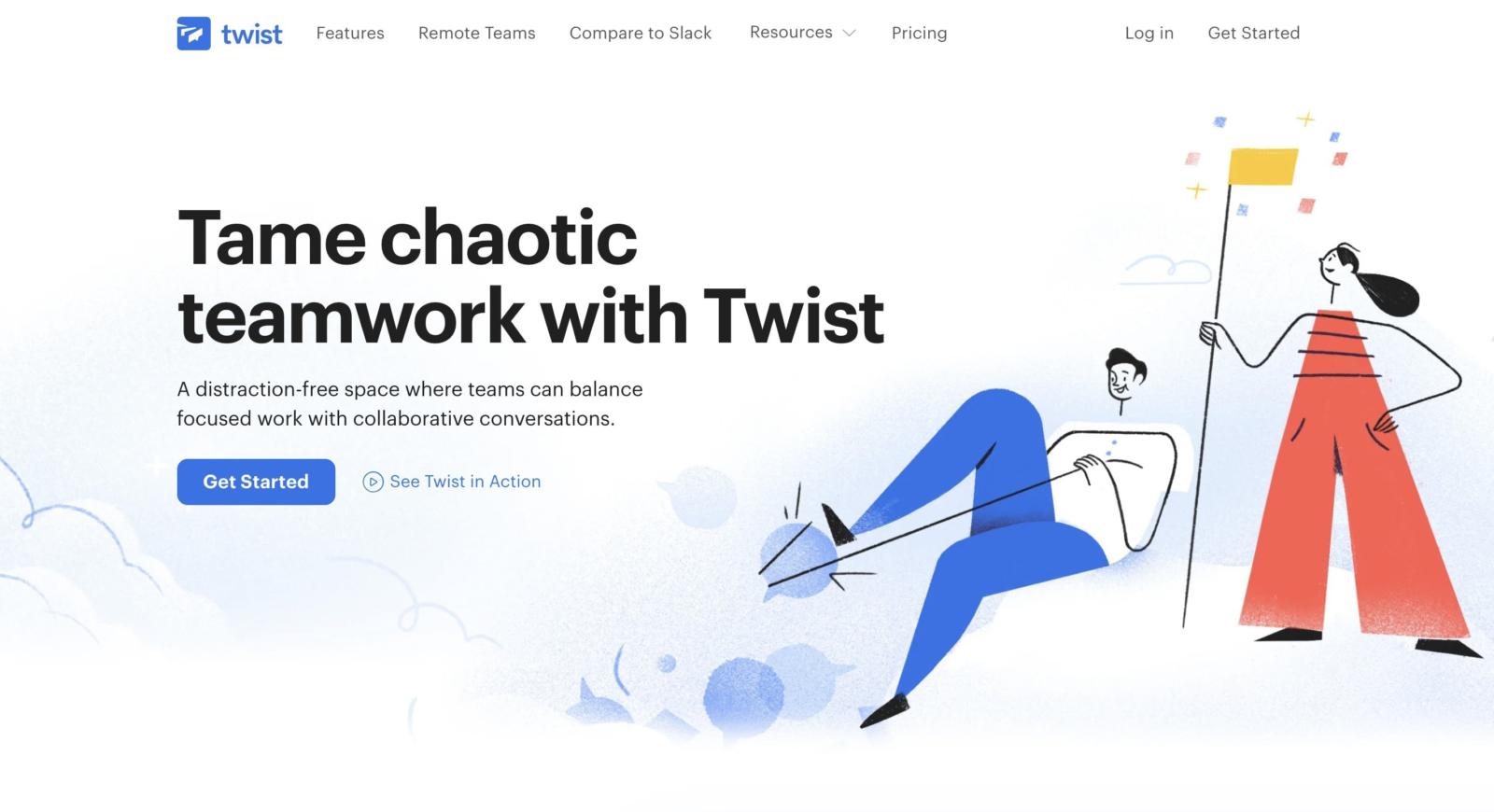
Features: Real-time communication, ability to organize threads within channels, file sharing, seamless email integration.
Suited for: Day-to-day conversations, larger organizations.
Price
- Free: $0 per user per month
- Unlimited: $5 per user per month
5. focus booster
To no one’s surprise, focus booster is designed to help you stay focused. It’s the perfect way to track the time you spend on each task — even across devices.
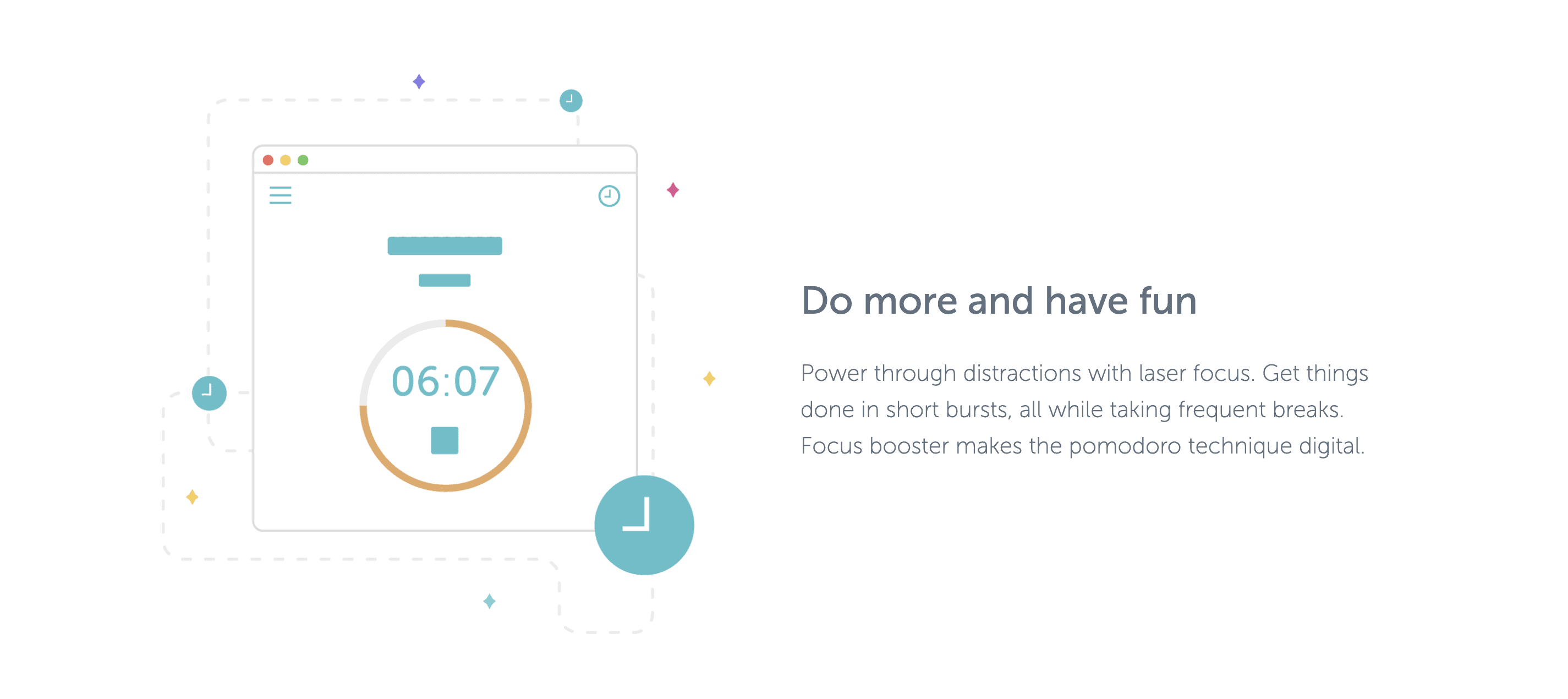
Features: Instant online timesheets, interval time tracking, in-depth reports, mobile tracking.
Suited for: Easily distracted individuals, freelancers, remote teams.
Price
- Starter: $0 per month
- Professional: $4.99 per month
Increase productivity for your team
6. Any.do
Any.do is an app that helps busy people get things done. While some consider it merely a list app, you’ll also get a calendar, notifications, and access to your own virtual assistant for better task management.
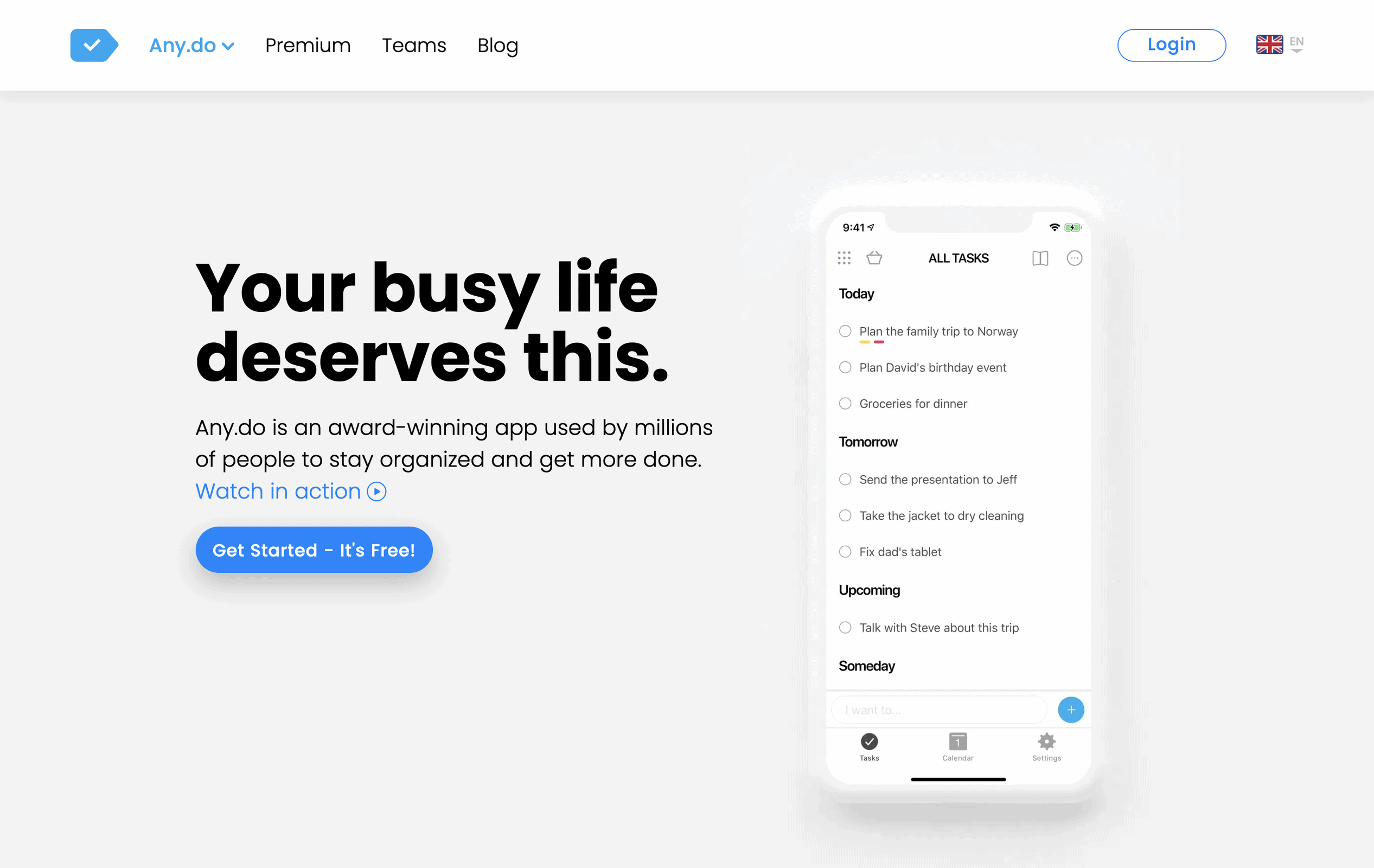
Features: Task list reminders via mobile and web app, calendar, notifications, and virtual assistant.
Suited for: Freelancers, remote work, personal needs.
Price
- 1 month: $5.99 per month billed monthly
- 6 months: $4.49 per month billed every 6 months
- 12 months: $2.99 per month billed annually
7. Todoist
Todoist is a time management app that helps you create your own to-do lists. Whether it’s for your own work, your team’s, or your work around the house, it can serve as your own personal assistant.

Features: To-do list reminders, notifications, collaboration option, projects with subprojects, recurring tasks, labels, and filters. Mobile version is available for iOS and Android.
Suited for: Freelancers, managers, remote teams, personal use.
Price
- Free: $0
- Pro: $3 per month billed annually, $4 per month billed monthly
8. Habitica
One of the best things about video games is the satisfaction you feel when you finish one. Seeing your daily tasks as video game achievements is one surefire way to increase your productivity. With Habitica, you’re playing your own character in the game of, well… life.
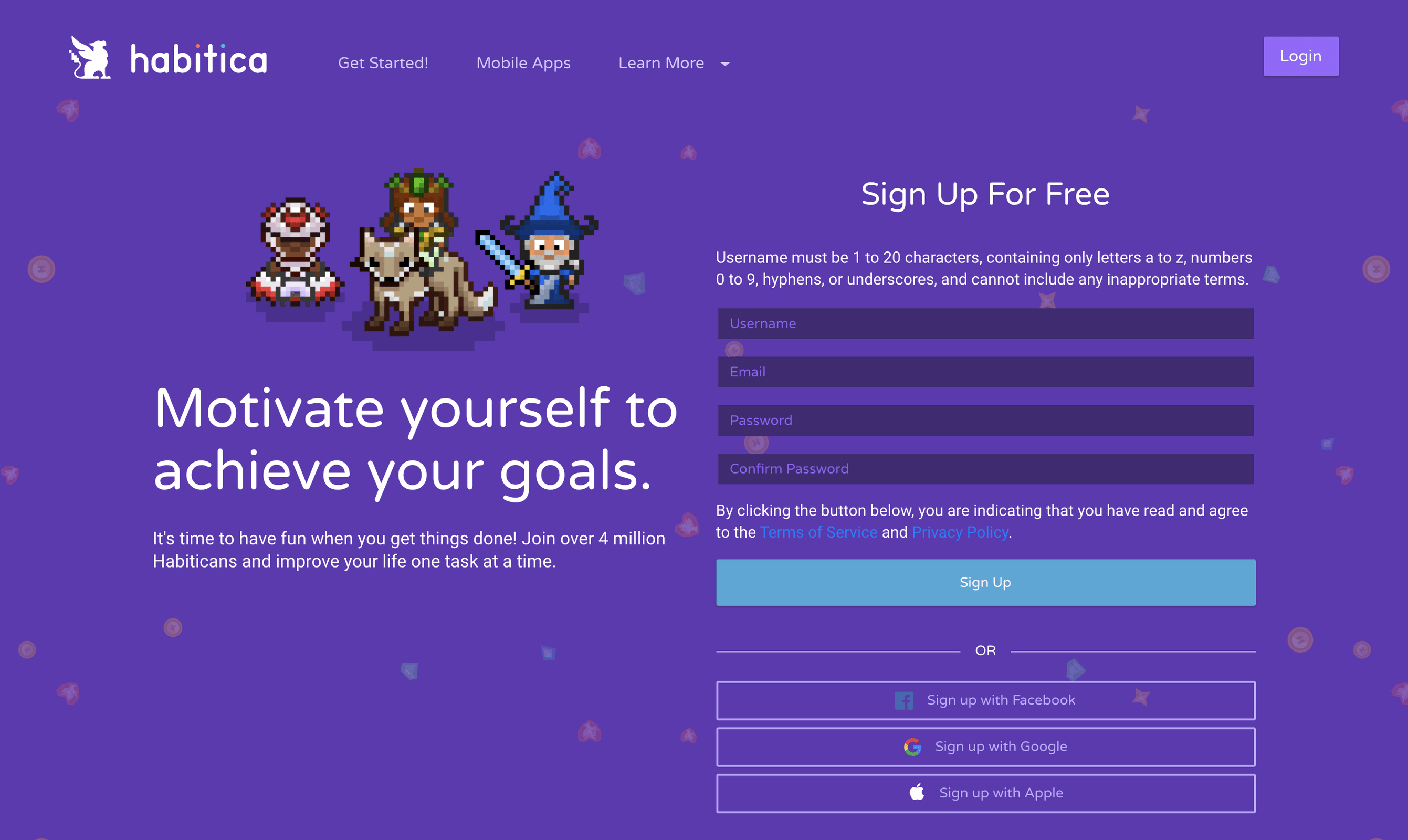
Features: Goal tracking, to-do lists, progress tracker, beautiful vintage videogame interface.
Suited for: People who want to be productive outside of work, people looking for a stepping stone to increasing their productivity, video game fans of all ages.
Price
- Free: $0 per month
- Group Price: $9 per month plus + $3 per member
9. Forest
Smartphones are amazing, but sometimes they can be the biggest hurdle to productivity. Forest is simple mobile app: you plant a tree for every new task. The tree grows when you don’t use your phone, and it dies when you leave the app.
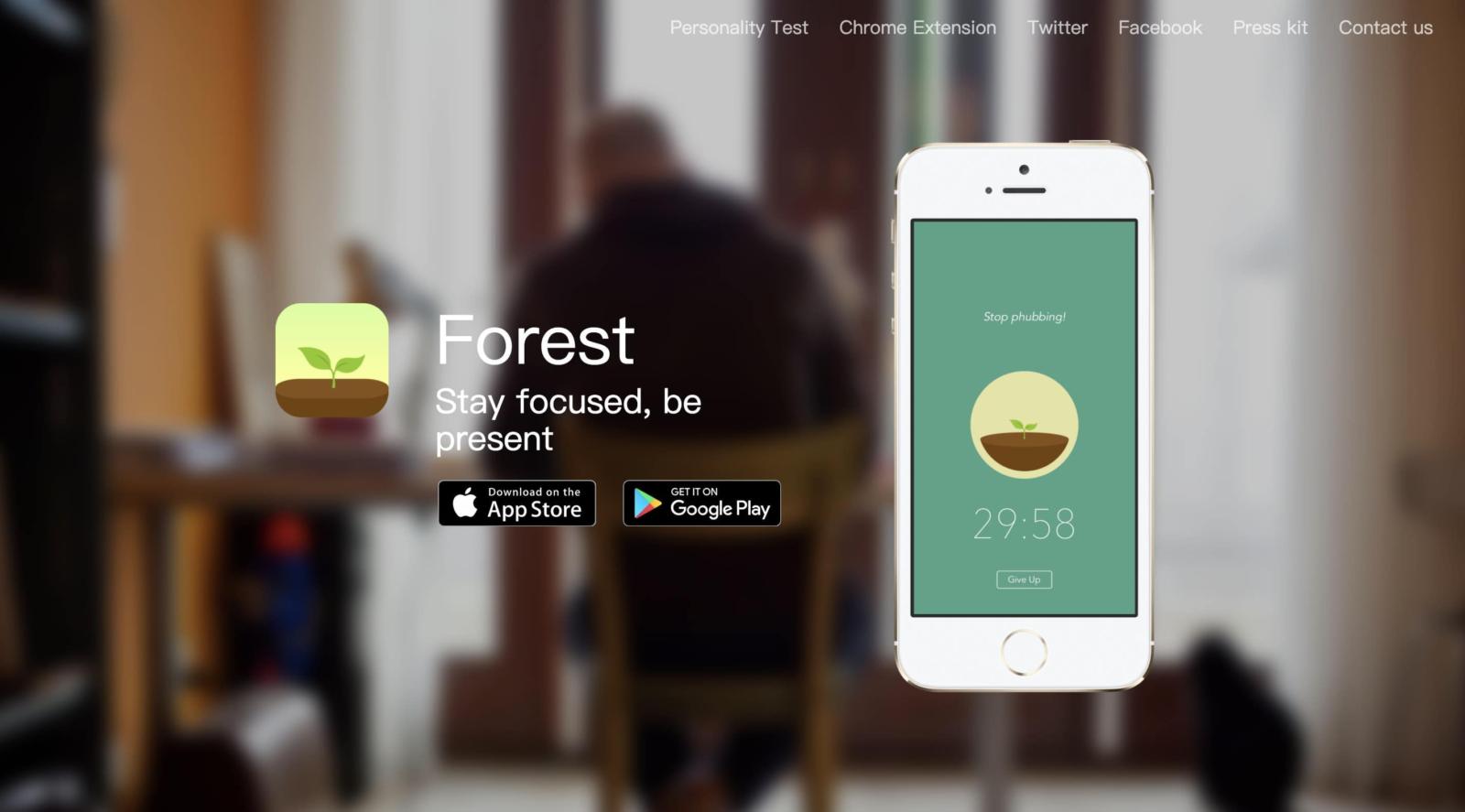
Features: Progress tracker, timer.
Suited for: People who find it difficult to focus, people spending too many hours on their phones, people looking for a productivity tool for personal use.
Price
- $1.99 on Apple Store/Google Play
10. Toggl
Toggl has three different tools: Toggl Track for basic time tracking, Toggl Plan for project management, and Toggl Hire for hiring new employees and freelancers. Depending on what you do, any of the three can help you manage your projects and day-to-day tasks.
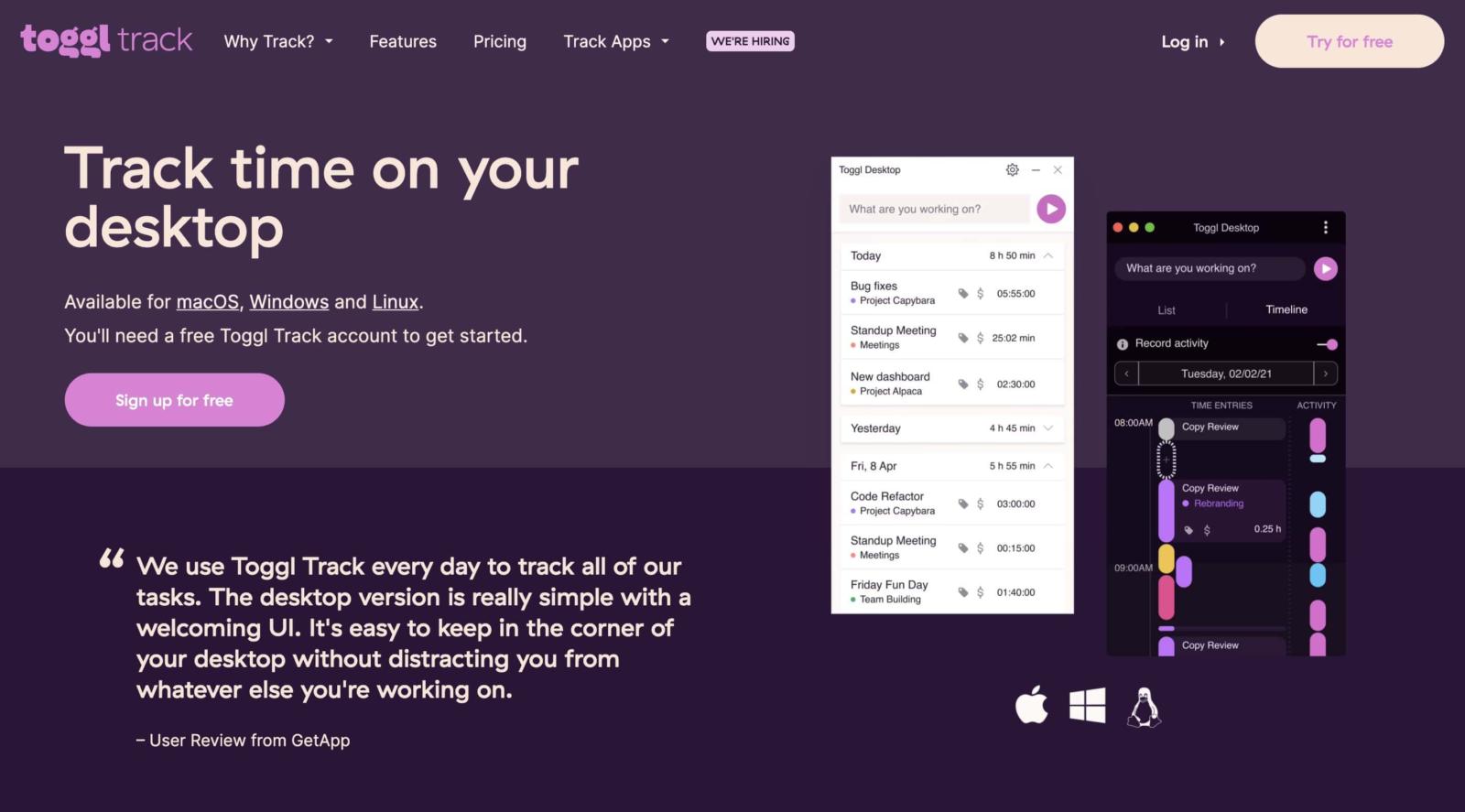
Toggl is popular amongst freelancers and companies that employ them. The ease of use and ability to switch seamlessly across devices makes it easy to onboard designers, developers, and other creatives with little to no hassle.
Features: Basic timer, Mobile app for iOS, Android, Apple Watch
Suited for: Freelancers, remote teams, project managers, individuals tracking hours for personal projects.
Price
- Free: $0 for up to 5 users
- Starter: $9 per user per month. Unlimited users.
- Premium: $18 per user per month. Unlimited users.
- Enterprise: Contact for a quote tailored to your organization.
11. RescueTime
RescueTime is a Seattle-based personal analytics tool that helps teams organize their time and increase productivity. Like Hubstaff, RescueTime goes a bit further than other tools on this list by exploring the tools teams use to be productive.
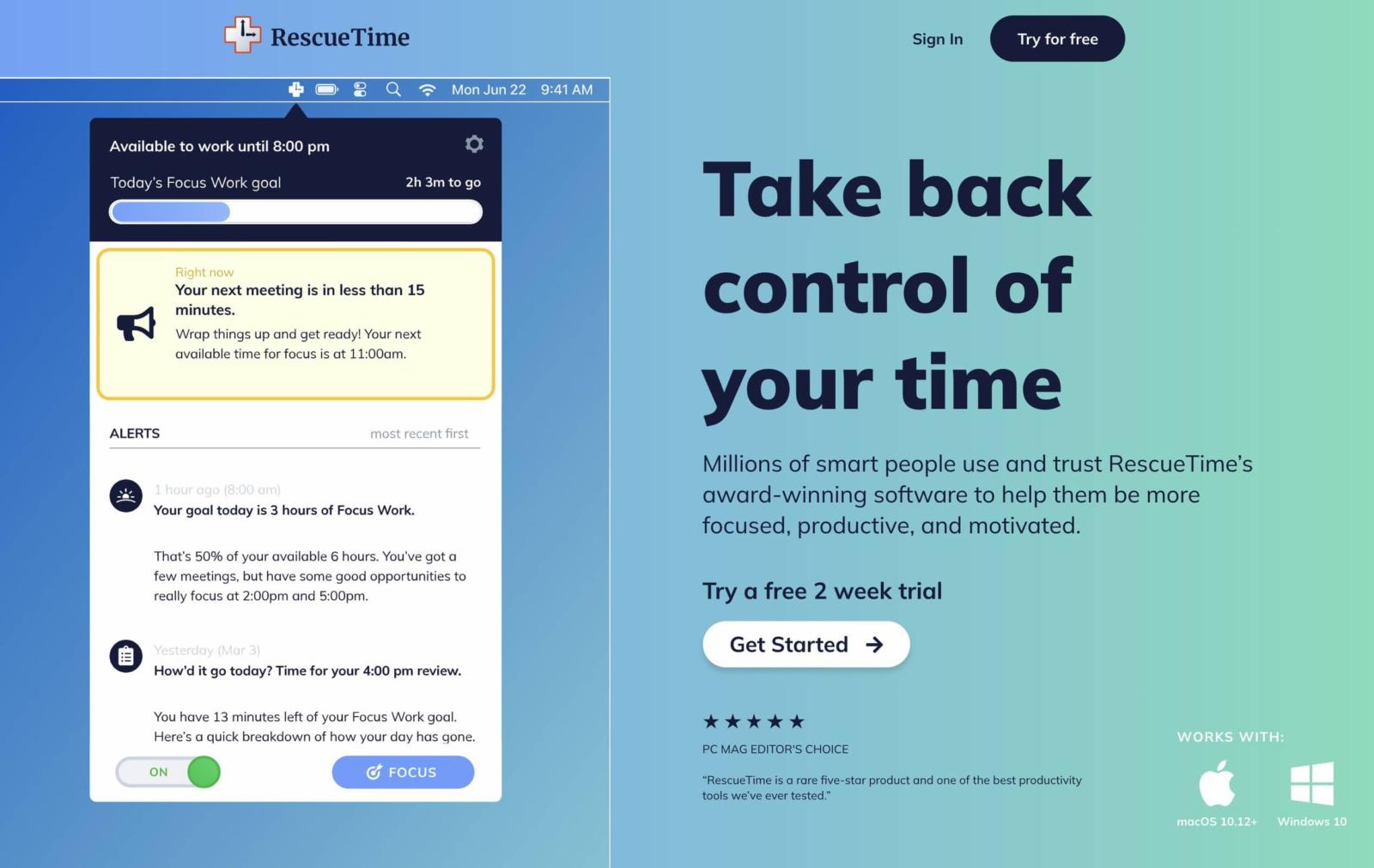
Another way it stands out from the rest is with Smart Coaching. This feature scans your schedule for meetings and focus time. The software then provides helpful tips throughout the day to help you get the most out of the hours you work.
Features: Basic timer tracking features, two-week free trial, Smart Coaching
Suited for: Freelancers, remote teams, project managers, enterprise-grade companies
Price
- RescueTime Lite: $0
- RescueTime Premium: $9 per month
12. Trello
Trello allows even the most novice project manager to take control of their team’s workflow. The free plan will give you access to Trello’s standard Kanban-based task management system with a few extra perks.

To use Trello, you’ll start by creating a board. Each new phase of your project will be housed on a card that you can add to said board. These cards allow you to add notes, create task lists, and add comments and users. You can then sort your cards into lists within the board. Most managers break their work into columns with titles like:
- To-do
- Doing
- Done
- Backlog
Trello also has a premium version, but it relies heavily on integrations with other apps. Miniscule file attachment capabilities will leave you downloading “Power-Ups” for apps like Box and Google Drive. The inability to close down tasks when they’re completed makes it difficult to organize and meet due dates.
Features: Kanban boards, task lists, timelines, calendars, commenting/notes features.
Suited for: Project managers, task management, remote teams, in-office teams, small to mid-sized teams.
Price
- Free: $0 for an unlimited number of team members
- Standard: $5 per user per month billed annually
- Premium: $10 per user per month billed annually ($12.50 billed monthly)
- Enterprise: $17.50 per user per month billed annually ($210 billed monthly)
13. Remember the Milk
Remember the Milk is an Australian web-based time management application. It allows users to create and manage task lists from their computer, mobile device, or Apple watch.
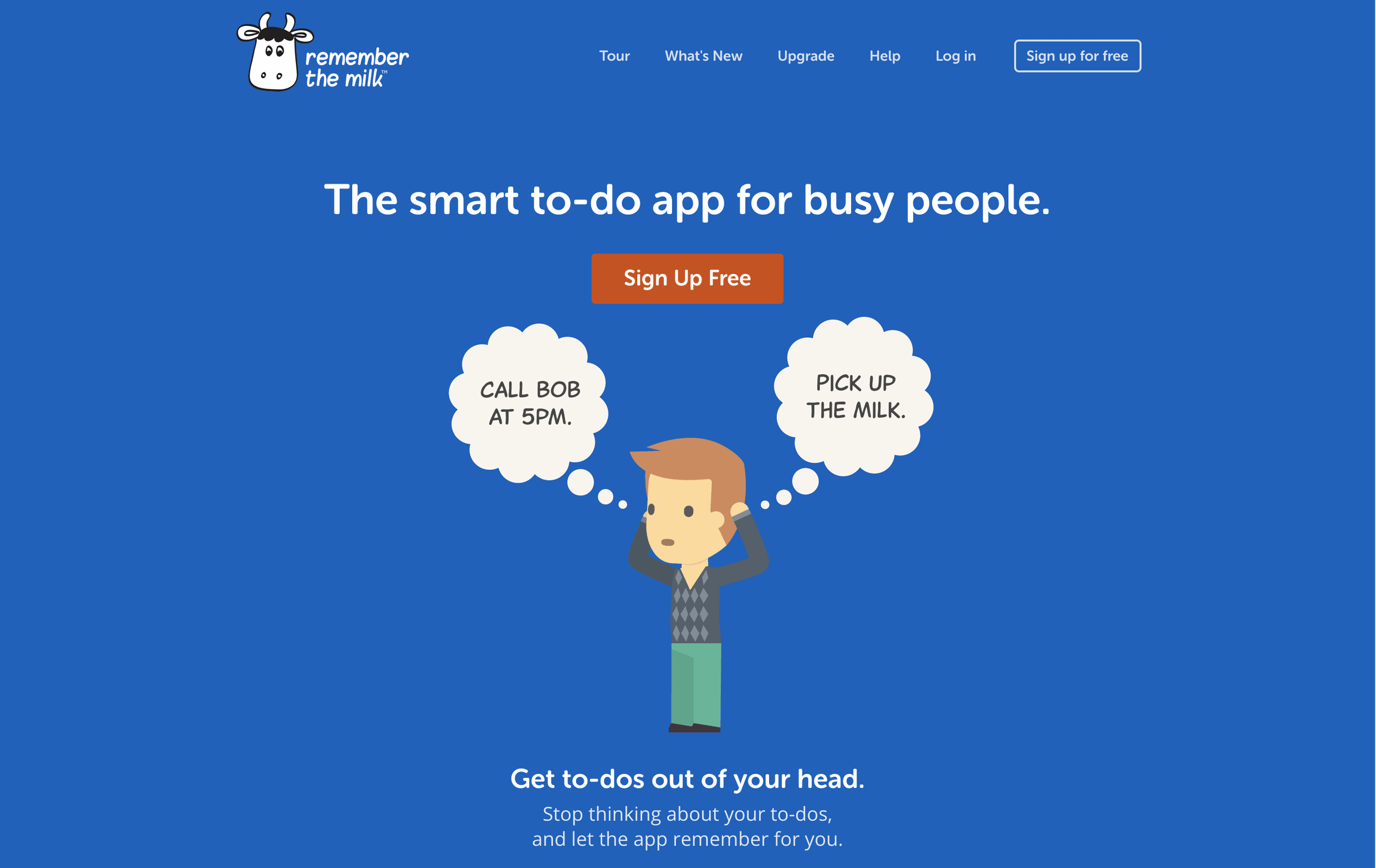
Like other tools mentioned, Remember the Milk relies heavily on the creation of tags and lists. To keep track of them all, you can color-code them. Remember the Milk can even differentiate between web-based tasks and tasks that require a phone to complete. This helps you stay focused and use only the device you need to be on to complete your tasks.
The Smart Add feature lets you enter all task specs in one line of text. Just enter the deadline, a priority level, repeat frequency, and any tags associated with the project. Once you have this all filled in, simply press enter and Remember the Milk will generate a task for you instantly.
Features: Device categorization, tags, Smart Add, compatibility with Apple Watch.
Suited for: Project managers, remote team managers, in-office teams, and individuals looking for a productivity app for personal use.
Price
- Free: $0 per year
- Pro: $39.99 per year
Make your time work for you
The first step to business-boosting time management is finding the right tool for the job. What’s your favorite time management technique? Do any of these time management apps help you get more done or manage your teams better?
Let us know in the comments.
This post was originally published in September 2018. It was updated by the Hubstaff Blog Team in October 2019 and August 2021.
Subscribe to the Hubstaff blog for more posts like this
Most popular
How to Calculate a Raise: Practical Guide for Employers
By 2030, the US alone will lose $430 billion annually due to low talent retention — and a lot of this turnover stems from low pa...
How to Survive and Thrive in an 80-Hour Work Week
It’s hard to believe that only a century ago, the 80-hour work week was the norm in the United States. Then, in 1926, the Ford M...
Mastering Workforce Scheduling: Techniques and Tools for Success
Imagine a workday where scheduling your workforce effectively ensures that every shift is perfectly aligned with your business nee...
Top Time Trackers for Virtual Assistants: Enhance Efficiency and Accountability
Virtual assistants (VAs) have a lot of responsibilities — and so do the people who hire them. With so much to keep track of, a t...
